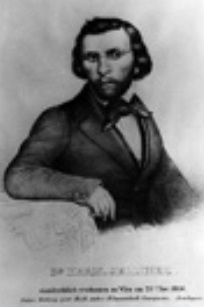 Herman Jellinek, the younger brother of Adolf Jellinek, was born and educated in Moravia (now in the Czech Republic). He continued his studies in Germany and earned a doctorate from the Leipzig University. He first attracted attention when he delivered a lecture on the occasion of Leibnitz’s 200th anniversary (1847) in which he opposed Leibnitz‘s philosophy. Hermann Jellinek was expelled from the university because of extremist activity. In reaction he wrote Das Denunciation System des saechsischen Liberalismus und des kritisch-nihilistische System Herman Jellineks (1847). He moved to Berlin, where together with Bruno Bauer he pursued his radical ideas.
Herman Jellinek, the younger brother of Adolf Jellinek, was born and educated in Moravia (now in the Czech Republic). He continued his studies in Germany and earned a doctorate from the Leipzig University. He first attracted attention when he delivered a lecture on the occasion of Leibnitz’s 200th anniversary (1847) in which he opposed Leibnitz‘s philosophy. Hermann Jellinek was expelled from the university because of extremist activity. In reaction he wrote Das Denunciation System des saechsischen Liberalismus und des kritisch-nihilistische System Herman Jellineks (1847). He moved to Berlin, where together with Bruno Bauer he pursued his radical ideas.
Having been expelled from Berlin, he moved to Vienna in the year of the 1848 revolution. At the same time he contributed articles to Die Grenzboten of Kuranda. Jellinek was more radical than his editor, and left the periodical. He contributed his revolutionary anti Habsburg articles to the Allegemeine Oesterreichische Zeitung and to Der Radikale. Those articles denote the influence of Karl Marx’s ideas on the writer. After the failure of the revolution and the declaration of the martial law, Jellinek’s friends begged him to leave the country, but he refused. He was subsequently arrested for his revolutionary activities and sentenced to death by a military tribunal along with his non-Jewish friend A.Becher. Jellinek was executed on November 23, 1848, but his friend not. It was suggested that Hermann Jellinek was executed because of his Jewishness, while A.Becher was a Protestant.
Hermann Jellinek’s works include Die Taeuschung der aufgeklaerten Juden und ihre Fachigkeit zur Emancipation (1847), in which he mocks the attempt of Jews to describe Judaism as an enlightened religion in order to gain equal rights.